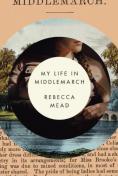BKMT READING GUIDES
My Life in Middlemarch
by Rebecca Mead
Hardcover : 293 pages
2 clubs reading this now
0 members have read this book
Rebecca Mead was a young woman in an English coastal ...
Introduction
A New Yorker writer revisits the seminal book of her youth--Middlemarch-- and fashions a singular, involving story of how a passionate attachment to a great work of literature can shape our lives and help us to read our own histories.
Rebecca Mead was a young woman in an English coastal town when she first read George Eliot's Middlemarch, regarded by many as the greatest English novel. After gaining admission to Oxford, and moving to the United States to become a journalist, through several love affairs, then marriage and family, Mead read and reread Middlemarch. The novel, which Virginia Woolf famously described as "one of the few English novels written for grown-up people," offered Mead something that modern life and literature did not.
In this wise and revealing work of biography, reporting, and memoir, Rebecca Mead leads us into the life that the book made for her, as well as the many lives the novel has led since it was written. Employing a structure that deftly mirrors that of the novel, My Life in Middlemarch takes the themes of Eliot's masterpiece--the complexity of love, the meaning of marriage, the foundations of morality, and the drama of aspiration and failure--and brings them into our world. Offering both a fascinating reading of Eliot's biography and an exploration of the way aspects of Mead's life uncannily echo that of Eliot herself, My Life in Middlemarch is for every ardent lover of literature who cares about why we read books, and how they read us.
Editorial Review
Rebecca Mead on writing My Life in Middlemarch
I first read Middlemarch, which many critics consider the greatest novel in the English language, when I was seventeen. The novel tells the interweaving stories of several residents of a provincial town in the Midlands; but to describe it this way is a bit like describing Everest as a really tall, ice-covered mountain. In its psychological acuity and generosity of spirit, in the deftness of its humor and immensity of its intelligence, Middlemarch offers everything we go to books for. Itâ??s awesome, in every sense of the word.
Iâ??ve gone back to it every five years or so since, and every time I see something new. When I was an anxious, aspiring teenager, it seemed to be all about the anxieties and aspirations of youth. In my twenties, stumbling through misbegotten love affairs, it seemed to be about the meaning of love and marriage. In my thirties, establishing my career as a writer, the novel seemed to offer cautionary insight into how one might or might not achieve oneâ??s ambitions. By the time I was forty, conscious of the doors of youth closing behind me, the book seemed to offer a melancholy insight into the resignations of middle age.
So revisiting Middlemarch by writing a book about it was also way of reckoning with the life I had lived so far: of looking at the choices I had made, the paths I had taken, and considering the alternative lives I had left unlived. For it, I read the diaries and letters of George Eliot, the bookâ??s author, who was born Mary Ann Evans in 1819; I visited the places she had lived, and I read about the lives of people who had been close to her. Having started out as the humble daughter of a provincial land agent, Eliot transformed herself into one of the dominant intellectual forces of her eraâ??first as an editor and critic for the most important London periodicals, and only later as a novelist. â??One has to spend so many years in learning how to be happy,â?? she wrote to a friend when she was just twenty-four. She did find happiness: in love found late, and in a vocation discovered in maturity. â??I feel very full of thankfulness for all the creatures I have got to love, all the beautiful and great things that are given to me to know, and I feel, too, much younger and more hopeful, as if a great deal of life and work were still before me,â?? Eliot wrote in 1861, when she was forty-one. Her greatest work was still before her: Middlemarch was ten years in the future.
I hope that I have written a book that can be read by people who havenâ??t read Middlemarchâ??though I also hope that my book will make those readers want to discover George Eliotâ??s masterpiece for themselves. I wanted to write a book that would speak to any passionate reader. Often, reading is thought of as escapism: we talk of â??getting lostâ?? in a book. But a book can also be where one finds oneself; and as I wrote My Life in Middlemarch I found that the novel spoke to me differently than it had during any of my earlier readings. Going back to Middlemarch gave me the chance to look at where I was in my life, and to ask myself how I had got thereâ??and to think, with a renewed sense of hopefulness, about where I might go next.
Discussion Questions
No discussion questions at this time.Book Club Recommendations
Recommended to book clubs by 0 of 0 members.
Book Club HQ to over 90,000+ book clubs and ready to welcome yours.
Get free weekly updates on top club picks, book giveaways, author events and more








